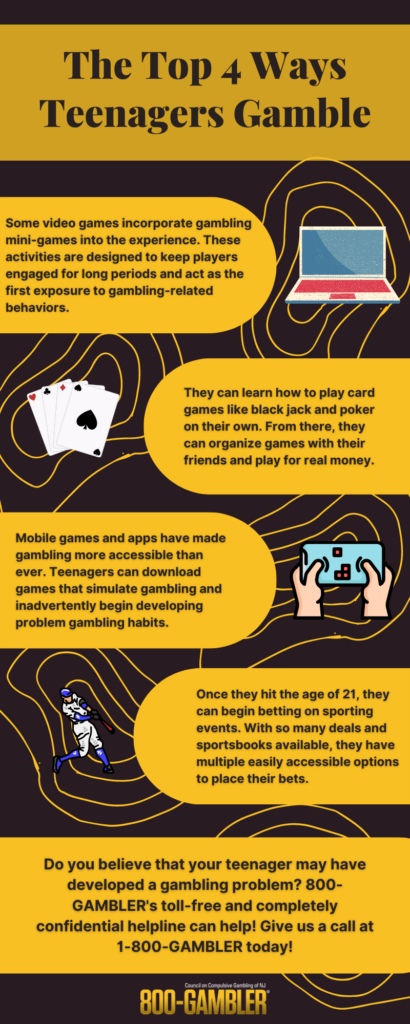Teenagers experience a whirlwind of changes quickly and can exhibit a wide range of behaviors that can concern parents. Some of these behaviors can be dismissed as “teens being teens.” However, can some of these behavioral changes be the first indications of your teenager struggling with a gambling problem?
While you might associate gambling problems with more mature adults, it can, unfortunately, present itself with teenagers. Even though the legal gambling age is 21, younger teens can also develop a gambling problem in high school. For parents worried about the welfare of their teenagers, here are some ways you can tell if your teenager has a gambling problem.
Are Teenage Boys or Girls More Likely to Develop a Gambling Problem?
While gambling problems can affect people of all ages, races, and genders, adolescent boys are likelier to develop a gambling problem than teenage girls. Teenage boys are more likely to develop one of these issues for various reasons. Their hyper-competitive nature, exposure to normalized betting associated with sports, and even video games can help cultivate an environment ripe for a gambling problem to develop and flourish.
Is It a Gambling Problem If They Aren’t Using Real Money?
Some video games may include specialized in-game mechanics and mini-games, which simulate gambling without using real money. Games such as Red Dead Redemption, The Witcher Series, Grand Theft Auto, and more incorporate gambling-focused mini-games and games of chance designed to keep players interacting with the game for hours at a time. While these mechanics often don’t require real-world currency, they can reinforce the behaviors associated with gambling.
Playing a game with a poker mini-game designed to mimic real-world things can give teenagers a distorted perception of reality regarding their luck. While the algorithm in the game can mimic the unpredictable nature of gambling, it often can’t match the unpredictability of a real-world gambling experience. As soon as they’re old enough to enter a casino, they may try to translate their gaming experience into their offline life and may be more susceptible to developing a gambling problem.
How Can Teenagers Gamble?

While video games are one of the most common ways teenagers can be introduced to gambling before they turn 21, it’s not the only avenue. Different mobile apps can act as their first exposure to gambling and associated behaviors. Some mobile games have been cleverly disguised as games of skill and chance with the ability to use real-world currency to buy power-ups and improvements to help give them a leg up.
Additionally, teenagers can organize their poker games and play for real money on their own. With things like the World Series of Poker and easily accessible online tutorials, they can learn how to run a game by themselves with their friends and begin gambling with their own money.
Identifying Warning Signs
Parents and their peers can help teenagers who have developed a gambling problem by knowing what some of the warning signs look like and getting them the gambling problem help in Atlantic City, NJ, that they need. These early teenage gambling warning indicators can include:
- Stolen money or credit cards to fund their habit
- Significant dip in academic performance
- Frequently lying about who they’re hanging out with or where they go
- Social isolation
- Developing anxiety or depression
Get Your Teenager the Help They Need with 800-GAMBLER
Knowing where you can turn to get your teenagers the help they need with their gambling problem can help them get their life back on track before it’s too late. In addition, having a reliable resource that can help find specialized meetings and ways to build their support network can help ensure they’re ready to make positive changes in their lives. 800-GAMBLER provides access to a wide range of resources for recovering gamblers of all ages and backgrounds.
If you or a loved one is dealing with a gambling problem, our 24/7 free and confidential helpline is here to help. Contact our team to learn more about our gambling recovery resources in Atlantic City, NJ, and beyond today.



